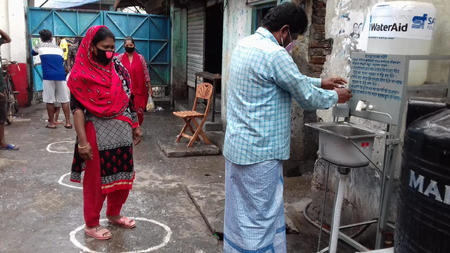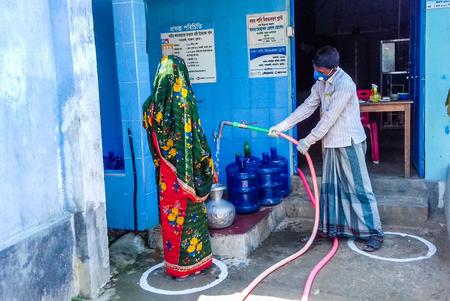Creative responses to COVID-19 in informal settlements

People living in crowded informal settlements have been severely affected by lockdowns and curfews enforced in response to the COVID-19 pandemic. Mbaye Mbéguéré and Rémi Kaupp share examples of inspiring local responses to the challenges, and our 'dos and don'ts' for tackling COVID-19 in informal settlements.
As you read this, you are probably experiencing – or have recently experienced – physical distancing. It is never a comfortable experience, but even less so if you are one of the billion people living in informal settlements or ‘slums’, where overcrowding is common and the economy often informal.
Most governments have reacted to the COVID-19 pandemic by issuing lockdowns, mandating people to stay at home and close businesses. But when businesses are informal and your economy functions on a day-to-day basis, such measures are both unfeasible and incredibly harmful to residents’ livelihoods. Adding insult to injury, some governments have also used the excuse of ‘sanitisation’ of urban areas to curb the spread of coronavirus to evict market traders and residents, effectively leaving them jobless and homeless.
Another common issue in informal settlements is poor access to water and sanitation. In many Indian cities, for instance, water is one of the primary reasons why the urban poor need to leave home every day. In other words, physical distancing is a luxury that only those who don’t have to make that daily trip can enjoy.
Clean water often costs more in informal settlements when it is provided by intermediaries, reducing the amount of water people can afford for handwashing. And with a lack of space, residents often rely on shared communal toilets, which can increase transmission risk through surfaces and can be hard for pit emptiers to de-sludge when full.
However, opportunities exist to highly organise service delivery in informal settlements during the pandemic, with local groups and community structures providing services and collecting data on residents and facilities. These groups are well-placed to mount COVID-19 responses, and many already are.
Grassroots COVID-19 responses in settlements
Some of the most inspiring responses to the crisis have been led by residents directly, either through newly established mutual aid groups, or existing networks of slum dwellers. For instance, in the Huruma and Mukuru areas of Nairobi, Muungano wa Wanavijiji, an association of residents, has been active since February, installing handwashing stations, producing maps and situation reports, and showcasing how residents are coping. They have even highlighted possible isolation areas. In Nigeria and Benin, similar federations of the urban poor have produced “Coronadiaries”, telling grassroots stories of the pandemic, which we strongly encourage you to read and watch!
In addition, initiatives like the one developed in South Africa to give voice to people living in informal settlements who face severe basic water and sanitation service shortages during the COVID-19 crisis are bottom-up responses worth highlighting. In this example, results of daily consultations are shared weekly with relevant municipalities and national public departments, to enable swift government responses.
Researchers are studying these dynamics, and lessons from previous outbreaks such as Ebola, to draw useful lessons: the Development Planning Unit has been looking at the post-COVID-19 “urban futures”, and a large team has suggested immediate actions to improve residents’ wellbeing, including: creating emergency planning committees in every settlement; an immediate moratorium on evictions; immediate cash transfers; deploying community health workers; providing immediate food, water and sanitation; and solid waste assistance.
Our position on responding to COVID-19 in informal settlements
In our response, we want to:
- Push for actions to be based on recognition of the rights of slum dwellers and meeting their needs.
- Adapt messages to the context of informal settlements.
- Learn from existing community-led activities.
- Advocate to authorities access to free and clean water, sanitation and handwashing.
- Strengthen the capacity of water and sanitation service providers.
For more specific examples, WaterAid Bangladesh have published a detailed guide (PDF) for COVID-19 response in densely populated slums. For instance, they are disinfecting water points and communal toilets and using public toilets as handwashing stations.
We are also advocating better recognition and support for sanitation workers, who provide essential services – and who could be even more at risk during the pandemic. There is emerging guidance to ensure that workers’ exposure is limited, but the reality is that in many cities this essential work is done without protection.
It is important to strengthen the capacity of water service providers to develop coping strategies for servicing the poorest people in crisis periods. Indeed, utilities in large cities of the global north and south, who have provided emergency responses during crises like the earthquakes in Nepal or in Haiti, can now take on the role of mentoring smaller southern utilities covering informal settlements. Utilities can face huge challenges in crises like this pandemic, and sharing experiences and lessons can be invaluable.
Our dos and don’ts
To support our activities in informal settlements during the COVID-19 response, we have established the following principles:
Do: Advocate distribution of free clean water to all informal settlement households, at least during the emergency response.
Don’t: Build a water supply mode that creates crowds.
Do: Install accessible handwashing facilities in various corners of the settlements.
- Consult with a variety of users or representative organisations to ensure location is suitable and safe for all.
- Make sure these facilities are operational and sustainable over time.
Don’t: Install any handwashing station without operational modality, including proper drainage/treatment of liquid waste generated that is potentially contaminated by coronavirus.
Do: Adapt messages to the context of informal settlements
- Make sure they are in line with equality and inclusion guidance and hygiene guidance.
- Create innovative options for maintaining physical distancing while accessing public water, sanitation and handwashing facilities (such as creating a rota, positioning facilities in a circle to maintain proper physical distance, etc.)
Don’t: Use a one-size-fits-all approach – inappropriate messages create doubt and jeopardise all communication efforts.
Do: Implement long-term solutions for appropriate, inclusive and sustainable service provision to settlements, in line with duties (for example, water kiosks or wholesale water supply points linked to mini networks, wells, boreholes.).
Do: Develop a strategy to quickly reinforce capacities of water, sanitation and hygiene service providers to supply these essentials to poor people.
Don’t: Support (directly or indirectly) the clearance of informal markets and housing in the name of 'sanitisation', or allow quarantining of entire informal settlements because of 'health risk'.
We hope these principles and examples make sense for you too. What would you add? Are there more good examples of community responses we should look at? Tweet us to let us know!
Mbaye Mbéguéré is Senior WASH Manager – Urban, and tweets as @MbayeMbéguéré. Rémi Kaupp is Urban Sanitation and Resilience Programme Advisor, and tweets as @RemKau.





